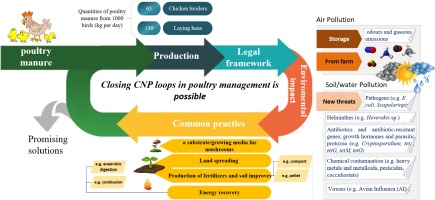当前位置:
X-MOL 学术
›
J. Environ. Manag.
›
论文详情
Our official English website, www.x-mol.net, welcomes your feedback! (Note: you will need to create a separate account there.)
Management of poultry manure in Poland - Current state and future perspectives.
Journal of Environmental Management ( IF 8.7 ) Pub Date : 2020-03-26 , DOI: 10.1016/j.jenvman.2020.110327 Danuta Dróżdż 1 , Katarzyna Wystalska 1 , Krystyna Malińska 1 , Anna Grosser 1 , Anna Grobelak 1 , Małgorzata Kacprzak 1
Journal of Environmental Management ( IF 8.7 ) Pub Date : 2020-03-26 , DOI: 10.1016/j.jenvman.2020.110327 Danuta Dróżdż 1 , Katarzyna Wystalska 1 , Krystyna Malińska 1 , Anna Grosser 1 , Anna Grobelak 1 , Małgorzata Kacprzak 1
Affiliation

|
This review aimed to analyse the current state of management practices for poultry manure in Poland and present future perspectives in terms of technologies allowing closing the loops for circular economy, and thus recovery of nutrients and energy. The scope of the review focused primarily on: (1) the analysis of poultry production and generation of poultry manure with special references to quantities, properties (e.g. fertilizing properties), seasonality, etc.; (2) the overview of current practices and methods for managing poultry manure including advantages and limitations; (3) the analysis of potential and realistic threats and risk related to managing poultry manure, and also (4) the analysis of promising technologies for converting poultry manure into added value products and energy. The review addressed the following technologies: composting of poultry manure to obtain fertilizers and soil improvers, anaerobic digestion of poultry manure for energy recovery, and also pyrolysis of poultry manure into different types of biochar that can be applied in agriculture, horticulture and industry. Poultry manure is rich in macro- and micronutrients but also can contain various contaminants such as antibiotics or pesticides, and thus posing a realistic threat to soil and living organisms when applied to soil directly or after biological treatment. The main challenge in poultry manure processing is to assure sufficient closing of carbon, nitrogen and phosphorous loops and safe application to soil.
中文翻译:

波兰家禽粪便的管理-现状和未来观点。
这篇综述旨在分析波兰家禽粪便的管理实践现状,并就允许封闭循环经济,从而回收养分和能源的技术方面的未来观点进行阐述。审查的范围主要集中在:(1)对家禽生产和家禽粪便的产生进行分析,并特别提及其数量,特性(例如,受精特性),季节性等;(2)概述目前管理家禽粪便的做法和方法,包括优点和缺点;(3)分析与管理家禽粪便有关的潜在和现实威胁与风险,以及(4)分析将家禽粪便转化为增值产品和能源的有前途的技术。审查涉及以下技术:将家禽粪便堆肥以获得肥料和土壤改良剂,对家禽粪便进行厌氧消化以回收能量,还将家禽粪便热解为各种类型的生物炭,这些炭可用于农业,园艺和工业。家禽粪便富含大量和微量营养素,但也可能含有各种污染物,例如抗生素或杀虫剂,因此直接或在生物处理后施用于土壤,会对土壤和生物体构成现实威胁。家禽粪便处理的主要挑战是确保充分封闭碳,氮和磷的循环并安全地施用到土壤中。以及将家禽粪便热解为不同类型的生物炭,可用于农业,园艺和工业。家禽粪便富含大量和微量营养素,但也可能含有各种污染物,例如抗生素或杀虫剂,因此直接或在生物处理后施用于土壤,会对土壤和生物体构成现实威胁。家禽粪便处理的主要挑战是确保充分封闭碳,氮和磷的循环并安全地施用到土壤中。以及将家禽粪便热解为不同类型的生物炭,可用于农业,园艺和工业。家禽粪便富含大量和微量营养素,但也可能含有各种污染物,例如抗生素或杀虫剂,因此直接或在生物处理后施用于土壤,会对土壤和生物体构成现实威胁。家禽粪便处理的主要挑战是确保充分封闭碳,氮和磷的循环并安全地施用到土壤中。
更新日期:2020-03-27
中文翻译:

波兰家禽粪便的管理-现状和未来观点。
这篇综述旨在分析波兰家禽粪便的管理实践现状,并就允许封闭循环经济,从而回收养分和能源的技术方面的未来观点进行阐述。审查的范围主要集中在:(1)对家禽生产和家禽粪便的产生进行分析,并特别提及其数量,特性(例如,受精特性),季节性等;(2)概述目前管理家禽粪便的做法和方法,包括优点和缺点;(3)分析与管理家禽粪便有关的潜在和现实威胁与风险,以及(4)分析将家禽粪便转化为增值产品和能源的有前途的技术。审查涉及以下技术:将家禽粪便堆肥以获得肥料和土壤改良剂,对家禽粪便进行厌氧消化以回收能量,还将家禽粪便热解为各种类型的生物炭,这些炭可用于农业,园艺和工业。家禽粪便富含大量和微量营养素,但也可能含有各种污染物,例如抗生素或杀虫剂,因此直接或在生物处理后施用于土壤,会对土壤和生物体构成现实威胁。家禽粪便处理的主要挑战是确保充分封闭碳,氮和磷的循环并安全地施用到土壤中。以及将家禽粪便热解为不同类型的生物炭,可用于农业,园艺和工业。家禽粪便富含大量和微量营养素,但也可能含有各种污染物,例如抗生素或杀虫剂,因此直接或在生物处理后施用于土壤,会对土壤和生物体构成现实威胁。家禽粪便处理的主要挑战是确保充分封闭碳,氮和磷的循环并安全地施用到土壤中。以及将家禽粪便热解为不同类型的生物炭,可用于农业,园艺和工业。家禽粪便富含大量和微量营养素,但也可能含有各种污染物,例如抗生素或杀虫剂,因此直接或在生物处理后施用于土壤,会对土壤和生物体构成现实威胁。家禽粪便处理的主要挑战是确保充分封闭碳,氮和磷的循环并安全地施用到土壤中。



























 京公网安备 11010802027423号
京公网安备 11010802027423号